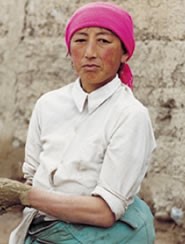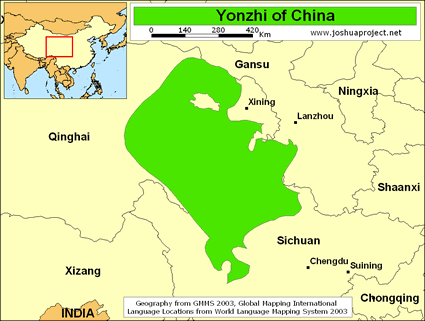The Yonzhi live as a distinct ethnic group in a remote area that has changed little for hundreds of years. Some consider them to be a part of the Golog, who in turn are officially counted as part of the Tibetan nationality in China.
For countless generations, the Yonzhi have lived simple lives, unaffected by events in the rest of the world. Joseph Rock, the famous botanist and explorer, stumbled across the Yonzhi in 1929. He recalls, "The people were astonished at sight of our party. One asked, 'Why this array of arms and force when visiting our territory?' We continued up the valley to the very foot of Amnyi Druggu, the mountain god of the Yonzhi tribe. A plague cursed the last few tents we passed, the nomads said. The inmates lay dying outside, covered with yak-hair rugs."
Today the Yongzhi people live as nomads in the central provinces of China.
The nomadic Yonzhi live in yak-hair tents and move every few weeks to find new pastures for their yaks, sheep, and goats.
In addition to worshiping Amnyi Druggu, the Yonzhi's Mountain deity, the Yonzhi live in the vicinity of Anye Machen Mountain. They believe it contains a powerful god of the same name. Pictures represent him as a white horse, with the sun and a rainbow to his right and the moon to his left. "All Tibetans worship Anye Machen; every monastery has either a picture or image of him. Anye means 'old man' and corresponds to our 'saint'. Ma means 'peacock' and chen 'great'. In China, if not the world, the Yonzhi are one of the most unreachable people groups. Their region is snowbound for most of the year with temperatures plummeting to minus 40° Celsius (-40°F). The Yonzhi move around frequently, relocating their homes and herds to new pastures. One can only access their communities by foot or horseback. To the Yonzhi, the gospel remains untold. It is possible no Yonzhi has ever heard the name of Jesus Christ.
Like people everywhere, the Yonzhi people need to allow the loving Savior to direct their lives. They need his forgiveness for sin.
Pray for the Lord to intervene in their families, calling people to his side.
Pray for loving, Holy Spirit led workers to go to them.
Pray for the Lord to draw Yonzhi hearts to himself.
Pray for a church planting movement to thrive in Yonzhi communities.
Scripture Prayers for the Yonzhi in China.
Operation China, Asia Harvest, Copyrighted © Used with permissiopermi
| Profile Source: Joshua Project |











